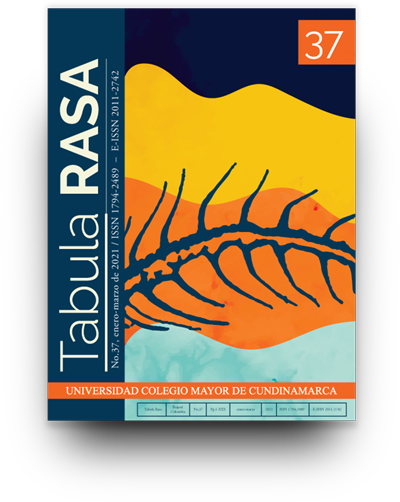Dialectics of Liberation: The Strategy of the MPL—Equality in Chile Sociopolitical Struggle
Dialéctica de la liberación: la estrategia de lucha sociopolítica del MPL-Igualdad en Chile
Show authors biography
This paper presents some of the results of a sociopolitical struggle strategy without, against and from the State. A part of a broader investigation on the senses and complex self management work processes in the Movement “Pobladores y Pobladoras en Lucha” (MPL) and its political party tool (Igualdad). Drawing from a decolonial analysis of world-systems, a longue-durée historical approach is put forward to situate data within the framework of expansion and contraction processes of self-management within the modernity-coloniality project. The methodology was founded upon a biographical approach with interviews to 12 MPL-Igualdad active members. Findings allow to characterize their sociopolitical strategies for anti-systemic liberation struggle. As a conclusion, their strategies go beyond housing issues and are projected, via a constituent prefiguration of habitat, in a horizon of community and intercommunity self-government based on the construction of popular power.
Article visits 116 | PDF visits 56
Downloads
- Amin, S. (2015). De Bandung (1955) a 2015: viejos y nuevos desafíos. América Latina en Movimiento, 504, 17-20. https://www.alainet.org/es/articulo/169988
- Bertaux, D. (2005). Los relatos de vida. Perspectiva etnosociológica. Barcelona: Bellaterra.
- Cattani, A., Laville, J., Gaiger, I. & Hespanha, P. (2009). Dicionário internacional da outra economia. Sao Paulo: Edicoes Almedina.
- Corbin, J. M. & Strauss, A. (1990). Grounded theory research: Procedures, canons, and evaluative criteria. Qualitative Sociology, 13(1), 3-21. https://link.springer.com/article/10.1007/BF00988593
- Dagnino, R., Brandao, F. C. & Novaes, H. T. (2004). Tecnologia social: Uma estratégia para o desenvolvimento. Rio de Janeiro: Fundação Banco do Brasil.
- Derlugian, G. (2015). Spaces, trajectories, maps: Towards a world-systems biography of Immanuel Wallerstein. Journal of World-Systems Research, 21(2), 448-459. https://doi.org/10.5195/jwsr.2015.14
- Dussel, E. (2009). Política de la liberación. Vol. II. Madrid: Trotta.
- Gaudichaud, F. (2015). Las fisuras del neoliberalismo maduro chileno. Buenos Aires: Clacso.
- Gaudichaud, F. (2016). Chile 1970-1973: mil días que estremecieron al mundo: poder popular, cordones industriales y socialismo durante el gobierno de Salvador Allende. Santiago: Lom Ediciones.
- Gómez, J. (2010). Política, democracia y ciudadanía en una sociedad neoliberal. (Chile: 1990-2010). Santiago: Editorial Arcis.
- Grosfoguel, R. (2013). Racismo/sexismo epistémico, universidades occidentalizadas y los cuatro genocidios/epistemicidios del largo siglo XVI. Tabula Rasa, 19, 31-58. https://doi.org/10.25058/20112742.153
- Hernández, C. (2018). La conformación del Estado neoliberal chileno y el cooperativismo. Autogestión. Para otra economía, 5, 30-32.
- Marx, K. (1973). El capital. Crítica de la economía política. México: FCE.
- Maturana, H. (1990). Emociones y lenguaje en educación y política. Santiago: Hachette.
- Mazzeo, M. & Acha, O. (Eds.). (2014). Reflexiones sobre el poder popular. Santiago: Tiempo Robado Editores.
- Mielants, E. (2012). The great transition debate and world-system analysis. En S. Babones & C. Chase-Dunn (Comps.). Routledge handbook of world-systems analysis. (pp. 56-62). London: Routledge.
- Muñoz, I. (2015). Popular self-management, social intervention and utopistics in the capitalist world-system. Review, Fernand Braudel Center, 38(1), 219-252.
- Roffinelli, G. & Kohan, N. (2006) He sido y sigo siendo un comunista. Entrevista a Samir Amin. En G. Roffinelli. La teoría del sistema capitalista mundial. (pp. 93-117). La Habana: Editorial de Ciencias Sociales.
- Salazar, G. (2009a). Del Poder Constituyente de Asalariados e Intelectuales (Chile, siglos XX y XXI). Santiago: Lom.
- Salazar, G, (2012). Movimientos sociales en Chile. Santiago. Uqbar.
- Wallerstein, I. (1998). Utopística, o las opciones históricas del siglo XXI. México: Siglo XXI Editores.




